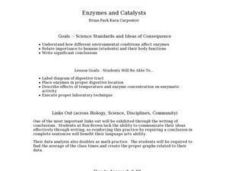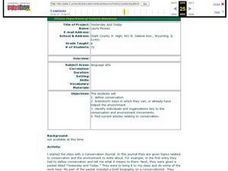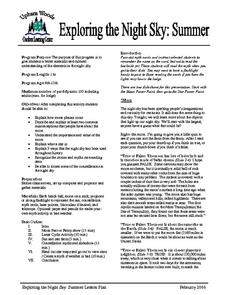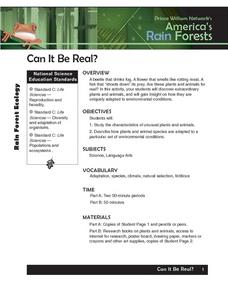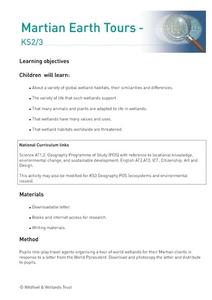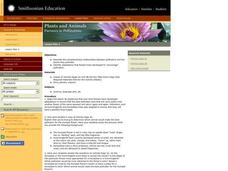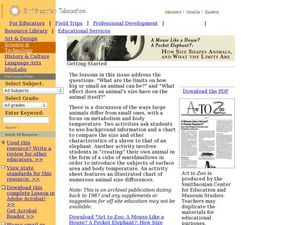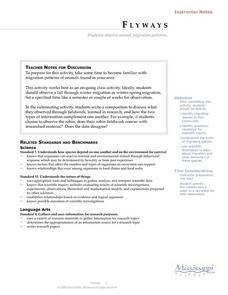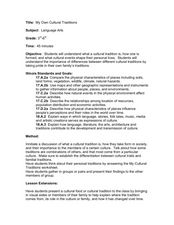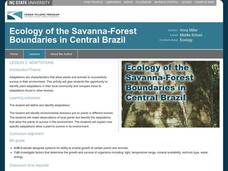Curated OER
Affecting Transportation Choices-Walk, Don't Ride!
Learners discuss methods of transportation they use and create a trip tally to determine which methods they use the most.
Curated OER
Passport to the Eastern Hemisphere
Seventh graders explore the Eastern Hemisphere. They investigate the customs, currency, climate, location and other facts needed in order to travel to a specific country. Students receive a stamp on their "passport" when their research...
Curated OER
Enzymes and Catalysts
Students discuss the functioning of the digestive system and the specific enzymes present. They observe the action of amylase on starch to identify characteristics of enzymes then perform an experiment on the effects of temperature on...
Curated OER
Exploring the Hudson in 1609
While this lesson focuses on a study of the Hudson River, it could be used as a template for a discussion of map skills, converting measurements, and plotting a route. The lesson includes vocabulary and other resources to make it a...
Curated OER
South Asian Architecture
Seventh graders review and discuss architecture from South Asia. They then study images of various buildings from North Africa/Southwest Asia, and make comparisons
Curated OER
Biggest Trees in the United States
Students use the Internet (or printed sources) to locate information. They fill in missing information on a graphic organizer (chart) and use the data to answer questions. The research skills help students to develop higher order...
Curated OER
Great Lakes Food Web
Students identify species and components of a Great Lakes food web. Using note cards, they place themselves in the correct order of the food chain based on the species present. They discuss what they believe happens to various species...
Curated OER
Yesterday and Today
Eighth graders are introduced to the concept of conservation. As a class, they brainstorm ways in which they can or already have helped the environment. Using the internet, they research key individuals and organizations that help the...
Curated OER
Urban Ecosystems 4: Metabolism of Urban Ecosystems
Cities are compared to living, breathing, metabolizing organisms. Fourth in a five-part series of lessons, this one focuses on the flow of materials through a city. Links to interesting websites and images make your delivery of...
Curated OER
GLOBAL WARMING
Students form definitions of the greenhouse effect based on prior knowledge, class discussion, viewing diagrams, and participate in group brainstorming sessions and class discussions related to the impact of the greenhouse effect and...
Curated OER
Exploring the Night Sky: Summer
Students explain how moon phases occur. They describe and explain at least two common misconceptions that people have about the moon. Students explain what a star is. They explain 3 ways that the night sky has been used throughout history.
Curated OER
Asthma Survey
Students collect survey data on the prevalence of asthma in a community. They summarize and display the survey data in ways that show meaning.
Curated OER
America's Rain Forests Can It Be Real?
Students examine the attributes of unusual plants and animals before determining how they are adapted to specific habitat. They complete an associated worksheet. They make posters with information that they find during research sessions.
Curated OER
Martian Earth Tours
Students study a variety of global wetland habitats, their similarities and differences. They examine the variety of life that such wetlands support and determine that many animals and plants are adapted to life in wetlands, that...
Curated OER
Plants and Animals: Partners in Pollination
Students describe the complementary relationships between pollinators and the plants they pollinate, identify adaptations that flowers have developed to "encourage" pollination, and create and draw their own "designer" flowers.
Curated OER
How Size Shapes Animals
Students investigate how size affects large and small animals differently. In this animal lesson plan, students determine how size affects different animals by constructing their own animal out of marshmallows. Once students create...
Curated OER
Teeshirt Printing
Students become responsible and involved citizens. In this t-shirt printing instructional activity students design and create a teeshirt with a message about citizenship and responsibility. Natural objects are used as stamps.
Curated OER
You Be the Judge
Students research and evaluate a case considered by the U.S. Supreme Court regarding the jurisdiction of the Clean Water Act. They watch a Bill Moyers video, conduct a debate, and write about the decision they would make if they were a...
Curated OER
Animal Migratory patterns
Young scholars use field research and traditional research to identify migrating species of birds as well as their migratory patterns. Students generate a list of questions regarding migration and a plan to research the questions. A...
Curated OER
Rain Forest Reporters
Students research and write articles for an imaginary scientific magazine about rain forests. In this rain forest lesson, students research both ecosystems and magazine writing styles. They act as reporters and editors of their own...
Curated OER
My Own Cultural Traditions
Students complete a worksheet on personal traditions. In this cultural traditions lesson, students discuss what a cultural tradition is and why they are important to the members of the culture. Students distinguish between cultural...
Curated OER
Adaptations
Sixth graders identify plant adaptations. For this adaptations lesson, 6th graders use digital cameras to photograph plants found on their campus. Students describe the adaptations for each plant.
Curated OER
Designing Future Houses
Students discuss the changes we face and what kind of future house designs students can imagine. They create a floor plan, make an architectural drawing, and write a short description about their future house.
Curated OER
Pollution Prevention in Schools
Students review P2 concepts they learned in previous lessons and explore how to reduce the pollution in their school. They also examine ways to conserve energy.




